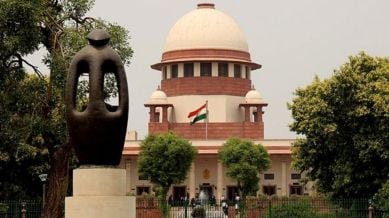Stay updated with the latest - Click here to follow us on Instagram
Challenge to UAPA amendments: Supreme Court sends matter to Delhi HC
The amendments give the Union government the power to designate individuals as terrorists. Under the original 1967 Act, only organisations could be designated as such.

The Supreme Court Tuesday declined to entertain petitions challenging the amendments made to the Unlawful Activities (Prevention) Act in 2019 and transferred the case to the Delhi High Court.
The amendments give the Union government the power to designate individuals as terrorists. Under the original 1967 Act, only organisations could be designated as such.
monthly limit of free stories.
with an Express account.
A three-judge bench led by Chief Justice of India Sanjiv Khanna said the top court cannot be the court of first instance to hear the challenge to the amendments.
The CJI told the petitioner counsel Senior Advocate C U Singh: “A lot of problems arise, sometimes issues are left by your side, sometimes by the other side. Then we have to refer to a larger bench. Let it be first decided by High Court.”
Singh told the bench, also comprising Justices Sanjay Kumar and K V Viswanathan, that the petition has been pending in the Supreme Court since 2019 and that similar issues were already being adjudicated by the top court.
As the bench insisted that the matter should be first heard by High Courts, Singh urged that the petition should be transferred to the Delhi High Court instead of being disposed of.
“In our case, we are all retired eminent bureaucrats, we filed before the Supreme Court… we would find it inconvenient to get representation before other High Courts,” the petitioners submitted.
The bench allowed the request.
The plea contended that the “conferring of such discretionary, unfettered and unbound” power upon the Union government through the amendments is the “antithesis” to the Constitution’s Article 14.